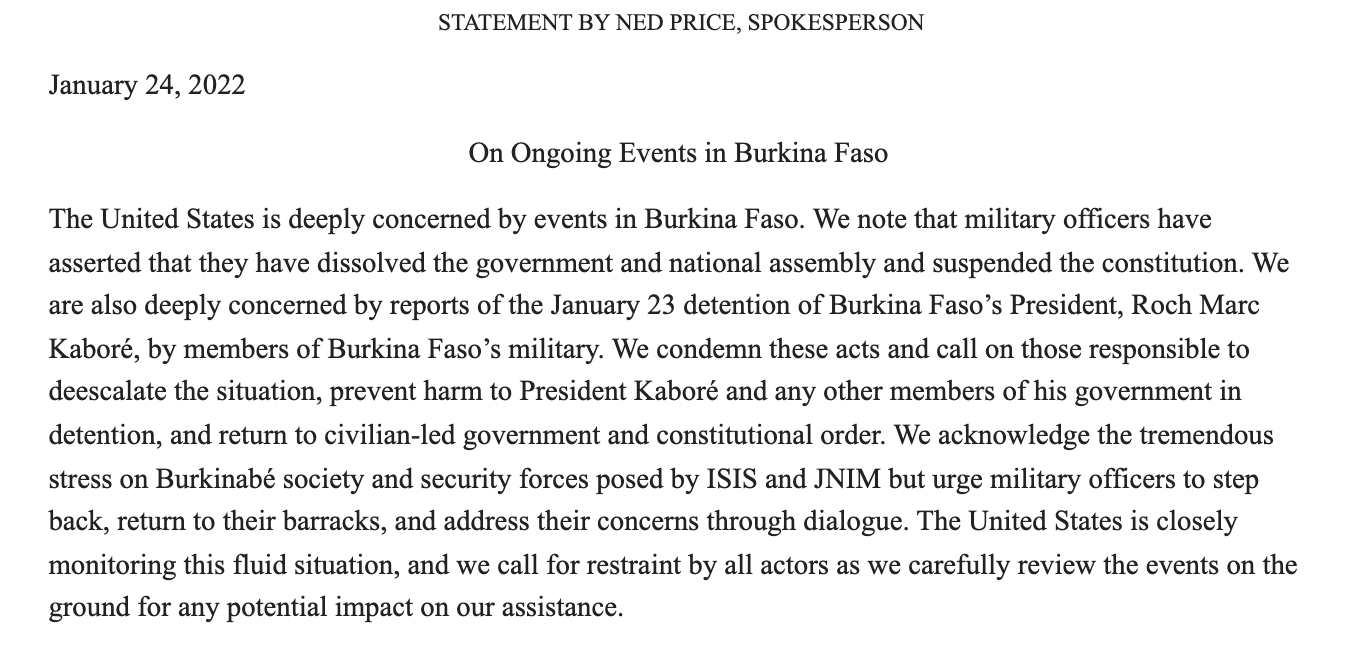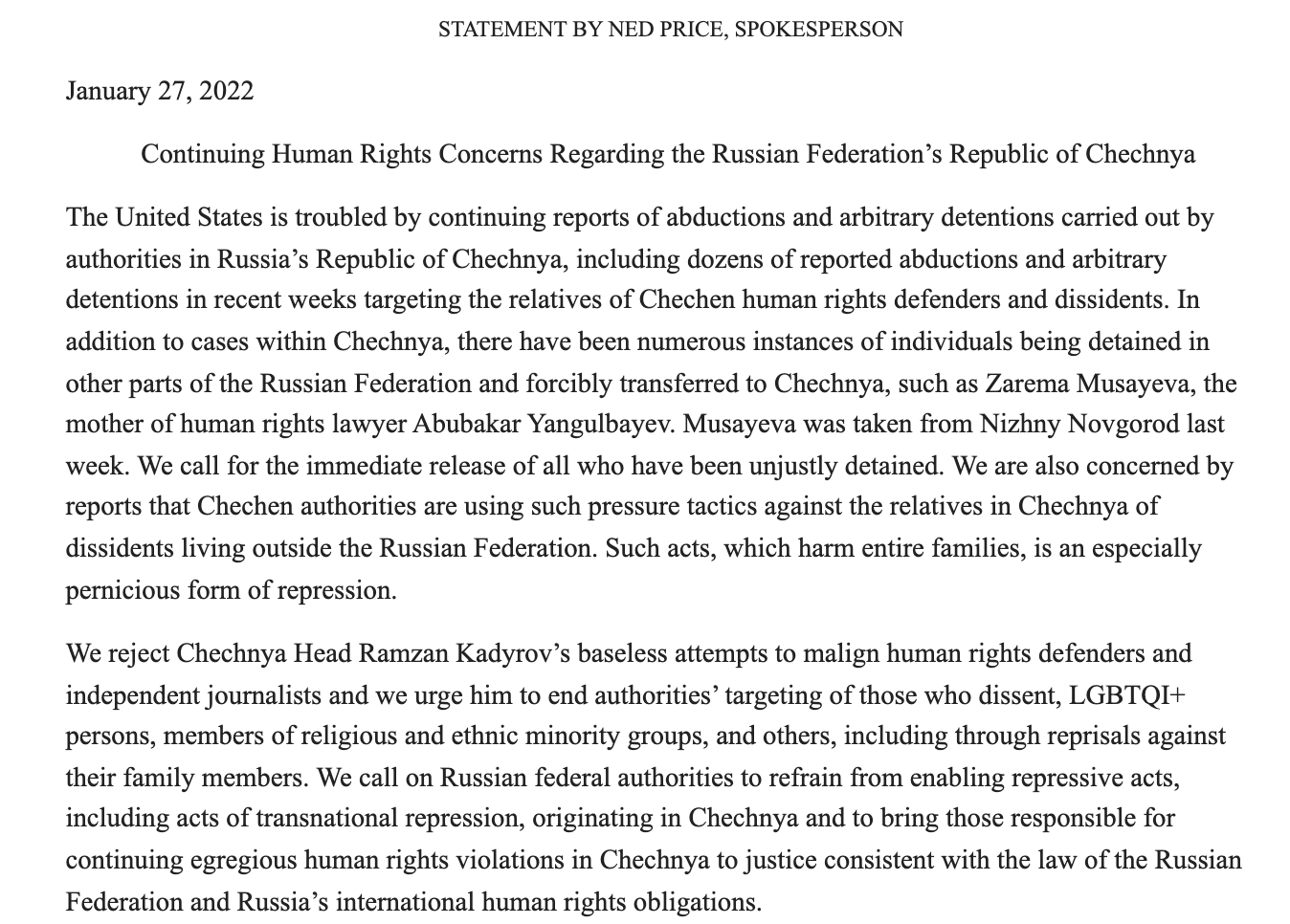A Russian invasion of Ukraine is a "distinct possibility."
I'm skipping the interview this week because the Russian military buildup along Ukraine's border is creating so much furor in Washington and Europe that there's no mental space left, at least in my brain, to think about anything else.
Russian officials have said they aren't planning to invade Ukraine. Still, Russian Foreign Minister Sergei Lavrov also told Russian radio stations that Moscow would "retaliate" if the West does not acquiesce to its security demands.
These demands are non-starters for the U.S. and its NATO allies, so we appear to be at an impasse.
Meanwhile, the Biden administration says that a Russian invasion of Ukraine in the next month is "a distinct possibility." European allies have a slightly different interpretation of the intelligence and appear to be holding out hope that Russia is bluffing to extract concessions.
For a full rundown of everything that's happened in the last week, please read the sections below.
If you enjoy this newsletter, please pay for it by upgrading to a premium subscription for $2 a month or $22 a year. If you can't afford that, show LAZO LETTERS some love and share the link with a friend.
Upgrade to a premium subscription by Clicking Here
Also, please feel free to send story tips or recommendations to: c.maza@protonmail.com. I'd love to know what you want me to cover and who to speak with for the newsletter.
What I'm writing:
• Ukraine’s neighbors are preparing for the worst amid the Russian military buildup. NATO allies are spending more on defense, offering training and weapons shipments to Kyiv, and calling for U.S. boots on the ground. Estonia announced that it would add approximately $428 million to its defense budget over the next three years. The current annual defense budget is around $800 million, so that sum is significant. Latvia’s government made a similar announcement this week, increasing its defense spending by almost $400 million. (This article is unlocked).
What I'm reading:
• The Pentagon announced that 8,500 U.S. troops were placed on heightened alert to potentially be deployed to Eastern Europe.
• The U.S. responded to Russia’s security demands but did not agree to the request to keep Ukraine out of NATO. The U.S. proposals could lead to discussions on ways to avoid confrontations in the Black Sea and introduce reciprocal missile-related inspections, the Wall Street Journal reports.
• NATO offered its responses to Russia and formally rejected Moscow's demands that NATO leaves Eastern Europe and bar Ukraine from entering the Western military alliance, the New York Times reports.
• NATO member states are bolstering NATO’s eastern flank, the Wall Street Journal reports. Denmark is dispatching a frigate to the Baltic Sea and will send four F-16 jet fighters to Lithuania. Spain is sending ships to join NATO forces in the Black and Mediterranean Seas and is considering sending jet fighters to Bulgaria. The Netherlands is deploying two F-35 jet fighters to Bulgaria from April. France has said it could send troops to Romania.
• The European Union announced plans to send an additional 1.2 billion euros ($1.36 billion) in financial aid to Ukraine, the New York Times reports.
• A U.S. shipment of 80 tons of military equipment arrived in Ukraine, part of the Biden administration's $200 million lethal aid package, the Hill reports.
• A call between President Biden and Ukrainian President Volodymyr Zelensky “did not go well,” a senior Ukrainian official told CNN. Zelensky and Biden disagreed on the risk levels of a Russian attack.
• Moscow is sending medical units to the border with Ukraine in what appears to be the final preparations for an invasion, the Wall Street Journal reports.
• Russia's military buildup near Ukraine has expanded to include supplies of blood along with other medical materials that would allow it to treat casualties, three U.S. officials told Reuters.
• Russia is threatening to cut off gas to Europe if economic sanctions are imposed on Moscow, the Washington Post reports.
• The Biden administration is putting together a global strategy to increase shipments of liquefied natural gas to Europe if a Russian invasion of Ukraine leads to gas shortages, CNN reports.
• Australia is considering supplying extra liquefied natural gas to Europe after the U.S. and the U.K. raised concerns about the continent’s reliance on Russia for gas, the Guardian reports.
• The United Kingdom's Foreign Office accused Russian President Vladimir Putin of plotting to install a pro-Moscow puppet government to lead Ukraine, taking the unusual step of naming former Ukrainian MP Yevhen Murayev as a potential Kremlin candidate, the BBC reports.
• Observers called the comments by the British Foreign Office into question because four of the five men named by the U.K. live in exile in Moscow, the Guardian reports.
• The Washington Post has more details on the five individuals singled out by the Foreign Office. They all worked in ousted President Viktor Yanukovych's office.
• Talks on the conflict in Eastern Ukraine are somehow still taking place. After eight and a half hours of discussions in Paris, advisers to the leaders of Russia, Ukraine, France, and Germany, the so-called Normandy Format, issued a joint declaration vowing “unconditional observance of the cease-fire" in the Donbas despite differences on other issues related to the implementation of the Minsk agreements.
• A group of pro-democracy hackers known as the Cyber Partisans said they infiltrated the Belarusian rail network to disrupt the movement of Russian troops into the country.
• Ireland’s Foreign Affairs Minister said that planned Russian naval exercises –set to take place within Ireland’s Exclusive Economic Zone but not its territorial waters – are not welcome or wanted right now, CNN reports.
• Irish fisherman plan to peacefully disrupt the Russian exercises, a local fishing organization told Politico Europe.
• Russia announced new military exercises spanning from the Pacific Ocean to its western flank with Ukraine. The drills involved tanks and drones, troops from regular infantry and elite paratroopers, and three navy ships taking part in joint exercises with the Chinese fleet in the Arabian Sea, the New York Times reports.
• Major European and U.S. businesses are seeking to balance their commercial interests in Russia with pressure from their governments to isolate Moscow. For example, top Italian business executives joined a videoconference with Russian President Vladimir Putin, the Wall Street Journal reports.
• Croatia will buy 89 U.S. Bradley fighting vehicles as part of a plan to form an infantry brigade to aid NATO, Croatian Prime Minister Andrej Plenković announced.
• Rights activists and journalists targeted by NSO Group’s Pegasus spyware in Hungary are mounting a legal campaign to challenge the Hungarian government’s alleged use of the technology, the Washington Post reports. The Hungarian Civil Liberties Union, representing six clients, said it would take legal action both in Hungary and abroad.
• Poland’s ruling Law and Justice party is trying to block a parliamentary inquiry into allegations of the government-sponsored hacking of opposition politicians’ phones, Politico Europe reports.
• Humanitarian groups say the Greek government made conscious policy choices that fomented a hunger crisis in refugee camps, the Guardian reports.
• The Soviet-era Georgian chess master Nona Gaprindashvili is suing Netflix over alleged defamation in the show the Queen's Gambit, Radio Free Europe reports.
• Kazakhstan, Kyrgyzstan, and Uzbekistan were hit with electricity blackouts, highlighting problems with reliable energy supplies in Central Asia, the Diplomat reports.
• Differences have emerged within the U.S. negotiating team on how tough to be with Iran, and when to walk away from nuclear negotiations, the Wall Street Journal reports. Richard Nephew, the deputy special envoy for Iran who advocated for a tougher posture in the negotiations, has left the team.
• The International Monetary Fund's executive board warned El Salvador against making bitcoin a legal tender and called for “strict regulation and oversight of the new ecosystem," the Hill reports.
• North Korea’s Internet may have been hit by a second wave of outages in two weeks, possibly caused by a cyberattack, Reuters reports.
• Soldiers detained the President of Burkina Faso, Roch Marc Christian Kaboré, following fighting at military bases across the West African nation, the Washington Post reported.
• In an announcement on live television, the military in Burkina Faso said it seized power and overthrew President Kaboré, the Guardian reports.
• The leader of the rebellious troops, Captain Sidsoré Kader Ouedraogo, also said the military suspended the constitution, dissolved the government, and closed the borders, the Washington Post reports.
• Burkina Faso’s ruling People’s Movement for Progress party said that President Kaboré and a government minister survived an assassination attempt, the BBC reports.
• Representatives of the Taliban are meeting with Western officials in Norway for the first talks in Europe since the group took control of Afghanistan, the BBC reports.
• Fighting broke out to retake control of a prison in northeast Syria where ISIS fighters were holding hundreds of boys hostage, the New York Times reports. The U.S. provided airstrike support to the Syrian Democratic Forces, a Kurdish group fighting ISIS.
• At least 181 people were reportedly killed in the clashes after ISIS tried to stage a mass breakout from the prison, the BBC reports. According to the Syrian Observatory for Human Rights, those killed include 124 militants and inmates, as well as 50 police, SDF fighters, and prison guards.
What the State Department says:
Upgrade to a premium subscription by Clicking Here.
You can also contact me for any reason by writing to c.maza@protonmail.com.








